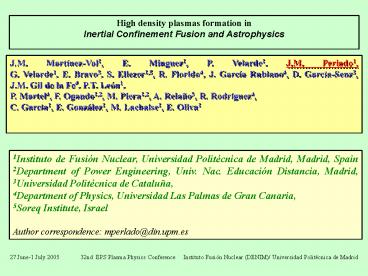Sin ttulo de diapositiva
1 / 20
Title: Sin ttulo de diapositiva
1
High density plasmas formation in Inertial
Confinement Fusion and Astrophysics
J.M. Martínez-Val1, E. Minguez1, P. Velarde1,
J.M. Perlado1,G. Velarde1, E. Bravo3, S.
Eliezer1,5, R. Florido4, J. García Rubiano4, D.
García-Senz3, J.M. Gil de la Fe4, P.T. León1, P.
Martel4, F. Ogando1,2, M. Piera1,2, A. Relaño3,
R. Rodríguez4, C. García1, E. González1, M.
Lachaise1, E. Oliva1
1Instituto de Fusión Nuclear, Universidad
Politécnica de Madrid, Madrid, Spain 2Department
of Power Engineering, Univ. Nac. Educación
Distancia, Madrid, 3Universidad Politécnica de
Cataluña, 4Department of Physics, Universidad Las
Palmas de Gran Canaria, 5Soreq Institute,
Israel Author correspondence mperlado_at_din.upm.es
2
OUTLINE
- Jet Impact Fast Ignition Fusion
- Inertial Fusion Features In Degenerate Plasmas
- Atomic Physics
3
Jet driven fast ignition1 (first proposal)
Spherical target guided by a gold cone and being
compressed by implosion to high densities, and
ignited on a surface point by a jet collision
jet
1 P. Velarde et al., IFSA03 (september 2003)
4
Production of adiabatic jets (previous knowledge,
basis of idea)
Jet generation depends on the angle and the
velocity and mass rate can be approached
M ?V.sen ?
For low cone angle we observe production of
drops It means the jet is unstable on cylindrical
geometry.
5
Adiabatic Jets (previous demonstrated knowledge
on the basis of idea)
- A cumulative effect driven by shock waves
collapsing on the axis. - High density and low temperature.
6
Adiabatic jet generation (experiment at Phebus,
DENIM 1997, on the basis of the idea)
7
Experiments on adiabatic jets
High density (1000 kg/m3) Medium temperature
(10-20 eV)
CH
C Espuma
J.Foster et al.(1999) Glendinning et al.(1999)
Logory et al., Ap.J.Suppl.(Apr.2000)
8
Jet driven fast ignition
P. VELARDE et al, Laser and Particle Beams 2005,
23, 14.
9
Schematics (a), and density plots at 835ps (b),
2000ps (c)
10
Conclusions on Jet Driven Fast Ignition Fusion
- Jet driven fast ignition or shell impact could be
a simpler alternative to the fast electron driven
fast ignition. - Main advantage of these new concepts are the
hydrodynamic behaviour of the full process and
they use only a single pulse. - There are a lot of room for improvement and new
ideas. - We need a multimaterial Riemann solver working
with AMR radiation transport that we can trust.
11
Contents in Inertial Fusion Features in
Degenerate Plasmas
- Fast Ignition in Inertial Fusion (thinking in)
- Degenerate Plasmas in Fast Ignition.
- Bremsstrahlung Emission in Degenerate Plasmas.
- Reduction of Static Ignition Temperature.
- Fast Ignition Nodal Energy (F.I.N.E.) Code.
Ignition Calculations for Degenerate and
Classical Plasmas (development of code)
12
Bremsstrahlung emission in Deg. Plasmas
- In the case of Bremsstrahlung emission, some of
the electron energy transitions are forbidden,
since the final electron energy state is totally
occupied (Fermi Function.) - The Bremsstrahlung emission in degenerate plasmas
is strongly reduced as compared with the
classical expression (Eliezer et al, Laser and
Particle Beams, 2003.)
13
(No Transcript)
14
Reduction of Ignition Temperature
- Static Ignition Temperature is defined as the
plasmas temperature where Fusion Energy (PF) is
equal to Bremsstrahlung Radiation (WB). - For well degenerate plasmas, Static Ignition
Temperature is smaller than the classical one,
due to smaller Bremsstrahlung emission (P.T. León
et al, Physics Letters A, 2001)
15
DT PLASMA
420.000 gr/cm3
4.200 gr/cm3
42 gr/cm3
16
Indep of Tplasma
17
Conclusions in Inertial Fusion Features In
Degenerate Plasmas
- Due to degeneracy effects, the ignition
temperature decrease with higher densities. If
the ignition temperature is below the Fermi
Energy of the plasma, the decrease in ignition
temperature is significant. - If the ignition temperature is above the Fermi
Energy, the lose of degeneration in the plasma
is fast (low specific heat of degenerate
plasmas), and the behaviour of the plasma is
similar to the classical one (for example, 1,000
gr/cm3.) - For this initial analysis, the Gain is smaller
for higher densities, due to the high compression
energy of the high density degenerate plasmas.
Further analysis of the burn-up phase are being
computed.
18
Atomic Physics / Analytical Potential ANALOP
Code
- Recently, an analytical potential including
plasma effects has been developed and introduced
in this code
- The new objective is to use this model to
calculate line shapes - and free-bound transition
J.M. Gil, et al, J. Quant. Spectrosc. Radiat.
Transfer
19
Fluorine Line Profile at low density
Gii 0.16
Gii 0.22
(eV)
At these densities the non isolated potential can
be used.
The line calculated with the non isolated
potential exhibits a red shift
20
Aluminum Absorption Cross section
Gii 1.9
The discrepancy with the non isolated potential
was expected due to the use of the Debye-Hückel
approximation in the determination of this
analytical potential at these high densities
(Giigt1). However, our analytical potential will
cover both low and high density ranges.































